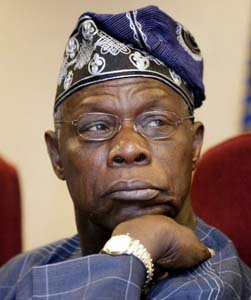


Posted by By LAURIE GOERING - Chicago Tribune on



For Nigeria, a nation long considered one of the world's most unrepentantly corrupt, the past few weeks have been remarkable.
LAGOS, NIGERIA - For Nigeria, a nation long considered one of the world's most unrepentantly corrupt, the past few weeks have been remarkable.
First the national police chief, who had recently resigned, was arrested and led away in handcuffs, accused of graft and money laundering.
Then the housing minister was fired, accused of selling government houses on the cheap to the well connected.
Finally, the head of Nigeria's Senate - the third highest-ranking official in the beleaguered West African country - resigned after being denounced by the president over bribery.
Nigerians, long used to seeing corruption as an indelible stain on the society's fabric, are slowly beginning to wonder whether the government's anti-graft campaign might be more than just political rhetoric.
"Everybody thought this was a gimmick," said Ibrahim Lamorde, Lagos operations manager for the 2-year-old Economic and Financial Crimes Commission, which under President Olusegun Obasanjo has led the fight against graft.
But since the police chief's arrest, in particular, "no one can believe it," he said.
Since the mid-1960s, when a series of military dictatorships began breaking down the newly independent country's fledgling institutions, Nigeria has become a world champion of graft.
Millions of barrels of the country's oil go missing each year, as do huge portions of government budgets.
Police demand bribes at road checkpoints, parents pay teachers to ensure that their children get passing grades and politicians sock away suitcases full of cash.
In Nigeria, "graft is a way of life," said Osita Nwajah, a spokesman for the government's anti-corruption commission. "All of Nigeria's problems - military, governments, poverty - you can trace to corruption. All of them have very deep roots in it."
Nigeria's leaders have for decades promised anti-corruption drives - usually at the same time they were shipping millions of dollars to Swiss banks.
But the campaign by Obasanjo, the country's first civilian ruler in a generation, seems different.
His administration, through the anti-corruption commission, moved first against the country's notorious e-mail fraudsters who, Nwajah said, "unfortunately have given the Nigerian nation a very bad image."
Hundreds of the scam artists - from schoolboys to major operations managers - have been arrested and $700 million in ill-gotten gains confiscated, Nwajah said.
None have gone to jail, but the flow of fraud e-mail has begun to slow as "we've sent a message down the line that it's no longer business as usual," he said.
More recently, the commission has targeted government officials, hauling in the former police chief and others.
Critics charge that the arrests are politically motivated and have focused on Obasanjo's political enemies while plenty of other graft kingpins are ignored.
Those arrested so far "aren't innocent," said David Awosokanre, a spokesman for Nigeria's Civil Liberties Organization, a group that has fought to combat corruption.
But he points to other instances of blatant graft that have not been prosecuted:
•The new national stadium built for $146 million but billed at $450 million.
•The former roads minister who simply resigned after $2 billion disappeared from the roads fund.
•The former education minister who was fired but never prosecuted after millions disappeared from his agency's coffers.
That means, for instance, improving the salaries of public servants and passing a public information bill that would allow citizens and activists access for the first time to budgets and the now-secret asset lists public officials must file.
Utomi said such changes are key to improving the plight of average Nigerians, two-thirds of whom get by on less than a dollar a day despite living in one of Africa's richest oil-producing nations.
--
